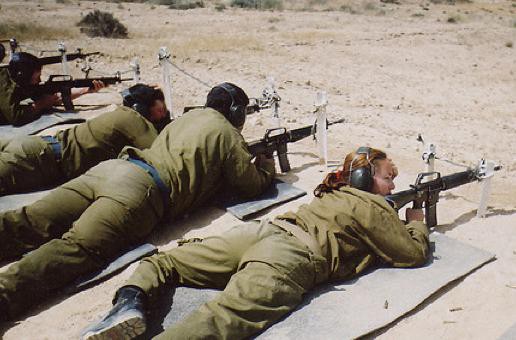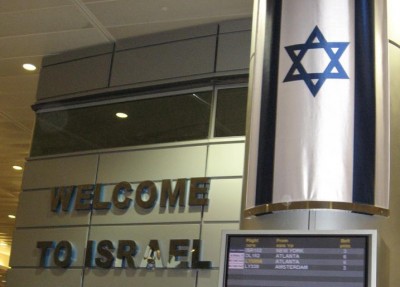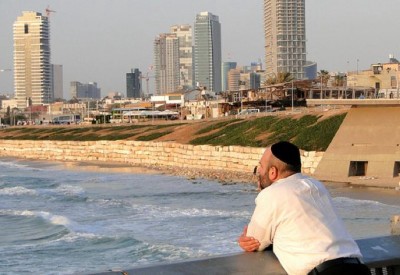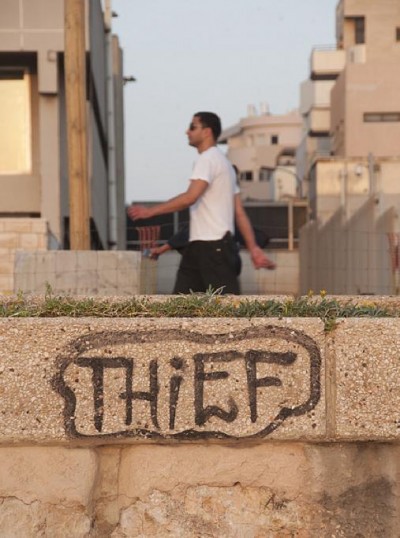Life After Zionist Summer Camp
by Allison Benedikt

It starts at a very young age. The summer after third grade, my parents sent me to Jewish sleepaway camp. I was deeply homesick at first and cried a lot in my bunk bed, but by the end of the month I didn’t want to leave. So I went back, summer after summer — boarding the plane with a few other Jewish kids from my hometown of Youngstown, Ohio, and flying to Appleton, Wisconsin, with a stop-over at O’Hare, where a volunteer from Hadassah would meet us at the gate and try to keep us from the moo shu pork at Wok-N-Roll.
Those summers blur together, but each day begins and ends at the flagpole, where we raise and lower two flags: the American and the Israeli. We make blue and white lanyard bracelets, carve Israel out of ice cream, and sing “Hatikvah.” Because it’s all Jews, I’m considered cute. The second summer, a boy (Avi, short, red-hair) asks me out (“Will you go with me?” “Go where?”) and I get my first kiss. Other kids from home also go to Jewish camp, but mine is different. It is, I learn, part of a Zionist youth movement. I am in a movement! Weird names like Jabotinsky and Herzl float through the air. I don’t have to know particulars to realize that these guys are (a) important, and (b) connected to me, and I to them.
There are real live Israelis at camp every summer. They have awesome names like Michal and Eyal and are rock stars with their rolling Rs and Israeli scout uniforms. They make me nervous. There’s Israeli dancing and Israeli singing and on movie night, we watch Raid on Entebbe. The counselors talk to us about “tikkun olam,” which roughly translates to “repairing the world” — this is something that Jews do very well because we are very good people.
Every so often we all pile into an empty cabin and are asked to stand under whichever sign taped to the wall best represents our idea of Zionism. Things like: “giving money to Israel,” “observing Jewish customs,” “moving to Israel.” The older I get, the cooler it becomes to stand under the “moving to Israel” sign. So I do. Our counselors tell us that they plan to spend a year in Israel after high school and this seems like something I might want to do too. Whatever “the diaspora” is, it does not sound good.

Summer ends, I go back home, I feel different. I stay up late talking to my camp friends on the phone. They’re in Lexington and Chicago and South Bend and Okemos, Michigan. Their lives are more Jewish than mine. They keep kosher — some have never even been to McDonald’s! This would be, in Youngstown, exotic. Tuesdays and Thursdays after regular school comes Hebrew School, which I dread like everyone else. We learn things that don’t apply to me — The Red Sea? The Burning Bush? — or are vague. A teacher hands out crayons and construction paper and ask us to draw a picture of God. I draw a big abstract swirl and then another. Ryan Kramer draws Kermit the Frog with a top hat. At 13, I have a Bat Mitzvah with an “SNL”-themed after party. That same year I visit my camp friends in Chicago and smoke my first cigarette and talk about joining the Israeli army. I don’t know about Palestinians. No one told me.
The summer before high school, I age out of my safe little midwestern camp and into the movement’s senior camp. It’s in upstate New York and brings together kids from all over the country. This is my first real brush with East Coast Jews. I am no longer considered cute, and those that are remark on my “Ohio shoes” and my flat accent. I don’t have Umbros; they do. And they’ve all already been to Israel! They know how to speak Hebrew! There are things called “day schools” in New York — this is the first I’ve heard about Solomon Schechter — and they all went to them. I am a full-on loser for a week, but then Shayna, also from Youngstown, makes it known that she brought Marlboro Lights, and the tide turns in our favor.
Between summers, I start to get involved in the youth group affiliated with camp. I run for office and win! I am Treasurer! I go to national conventions, where there are debates late into the night over whether “aliyah” (immigration to Israel) should be the goal of our “peer-led” youth movement, or a goal. I start to know people who are actually making aliyah — not just spending a year in Israel, but becoming Israeli citizens, and serving in the IDF.
The summer after 11th grade, I go on a six-week teen tour to Israel. It’s with all of my camp friends, and sponsored by the movement. It is amazing. I’m nervous when we take off, but it’s pretty cool how everyone on this plane is Jewish, like family. The last few rows are full of black-hatters, and we sneak back there to smoke — something that’s not-really-but-sort-of still allowed on El Al at the time. When we land in Tel Aviv, the flight crew plays Hatikvah and everyone claps. When we deplane, I kiss the ground.

Okay — there are soldiers everywhere and they are so handsome! We take a bus to Jerusalem — to a youth hostel in the neighborhood of Mount Scopus, specifically, which looks out over all of Jerusalem. Mount Scopus was a buffer zone after Israel’s War of Independence in 1948, but since the Six Day War in ’67, it’s been part of Jerusalem proper. These are details I don’t really know much about. There are Arab villages nearby, in the valley below, but I don’t know much about that either. What I do know is that Hebrew University is right across the street and Hadassah Hospital is down the block — two world-class institutions! Hadassah Hospital even treats Arabs.
Some stuff goes down that summer — a bombing? I can’t remember — and our counselors tell us to stay off the buses. Weird that my parents are cool with me being here. But I always feel safe. Everyone says that about Israel and it’s so true: You always feel safe. We hike in the Golan (beautiful), float in the Dead Sea (a little touristy), light candles at Yad Vashem, raft on the Jordan River, ride a camel, tour all the holy sites (except the Christian and Muslim ones) and do some serious bonding with each other and “the land.” We visit a kibbutz — finally! And I eat a lot of dairy — it just tastes better here. We go to Haifa and Eilat and Sderot, right near the Gaza Strip, whatever that is. I spend one weekend with a real Israeli family, and it is awkward — surprising, because we are all Jewish. I learn how to say “what the hell?” in Hebrew (ma pitom?) and say it a lot because it’s really funny. I become a huge David Broza fan and start wearing flowy pants with elastic waistbands that I buy from a vendor on Ben Yehuda Street.
Halfway through the summer is Special Interest Week, when we get to choose an elective, like water sports on the Kinneret or arts or hiking or the army. There’s really no question, and soon enough I’m wearing fatigues and standing in formation with all my best friends. I get to be commander for a day — this is the best summer of my life — and learn to shoot an M16. It jams into my shoulder and burns when I get off a round. I am a good shot.
Time flies and soon I’m packing up my paper target and everything else accumulated that summer, showering one last time in the flip-flops I bought at the shuk (market), putting on my IDF t-shirt, marveling over El Al’s security, and boarding the flight home. Or “home.” Everyone is sobbing. I listen to David Broza on my Walkman until I finally fall asleep on the plane.
The adjustment back to America is not easy. No one in Ohio understands me. Am I an American Jew or a Jewish American? If, hypothetically, America and Israel were to go to war, who would I fight for? I ask these questions.
It’s senior year. I drink a lot and break curfew with all the people who don’t understand me. We smoke weed in my Chevy Eurosport wagon on the way to the Tom Petty concert and my best friend is crowned Prom Queen. I visit my camp friends in New York — we share a massive frozen hot chocolate at Serendipity and they all talk about deferring college for a year to go to Israel. I decide to head to Ann Arbor in the fall instead. I very clearly remember that I’m not sure why.
The summer before college I return to the camp of my youth, in Wisconsin, as a counselor. I get the sense that it’s not a good idea to tell the campers that I’m not going to Israel in the fall, or that, though I do expect to make aliyah eventually, I’m not 100% sure. It’s a great summer. I am a Jewish leader! I’m still not really sure who Jabotinsky is, but the important thing is that the kids don’t know that I don’t know. It seems a little late for me to ask a friend.
College: I opt to live in the “Jewish dorm,” Markley Hall. I have trouble making friends. I gain a lot of weight. In November, Yitzhak Rabin is assassinated and I am sick not to be there. I talk to my friends on the phone long-distance and feel very removed. I don’t fit in anywhere. I hate college. I should have gone to Israel.

Freshman year happens. Sophomore year happens. Finally, my chance: I return to Mount Scopus, this time to attend Hebrew University for my junior year abroad. I make friends immediately, get a boyfriend, Craig, and feel like myself again. Early on, there’s a bombing in the shuk. The next week my friends and I go as a group to that same shuk — we will not be cowed. There are no other major attacks that year, at least as far I know. I don’t read the newspaper or watch the news while there, but Craig’s parents awesomely ship the “Seinfeld” series finale to him. We all chip in to rent a hotel room for the Oscars. My older sister comes to visit and looks up a friend from college who recently moved to Tel Aviv. I get the sense that they are more than friends.
I turn 21 in Jerusalem and must at this point know about the occupation, but who can say, really? I’m “not political.” But I have picked up the bullet points: In 1948, the Palestinians chose to leave Israel and now they want it back. They were offered part of the land and turned it down. Their Arab brothers in Jordan and Egypt won’t take them. They don’t “help their own” like we do. Israel has been at war for its entire existence, and the price of losing that war is another Holocaust. “Haven” is the word my parents always use. The world hates the Jews. We need a “haven” — and America isn’t it.
I rent a car with friends for a weekend up north, and know that there are certain places we shouldn’t drive. We take a trip to the Sinai and play cards with the really cool Arab hostel workers who give us drugs, and our guide for the trek up Mt. Sinai is very friendly, so we tip him well. I go to Jordan for a weekend with another girl from school, meet two sketchy Israeli guys at a café, and wisely decide to go camping with them in some remote patch of desert that night. If they are Israeli, they must be safe. I spend a couple of weekends with old friends from camp who are now serving in the IDF. I feel this weird sadness/emptiness/nausea in my stomach whenever I am with them. They look like they are playing dress-up in their uniforms. I should feel proud, but I don’t.
I go back to Ann Arbor. Senior year. I work at Zingerman’s, its own kind of cult, and fall for a coworker who spells his name not Marc but Mark. All of a sudden, I’m dating a non-Jew — a term he thinks is really funny. As if the world is divided like that! (It isn’t?) My parents aren’t too happy about Mark-with-a-K. “If you don’t date them, you won’t marry them,” they always said. I knew at least one couple who got divorced “because the wife wasn’t Jewish.” I didn’t want to get divorced.
Mark says something mean about Israel and I am confused. Or he is. He must be. I better find out. But I don’t, really. Or I do, but just a little. I find out just enough to know that I don’t want to know more. I graduate with my Jewish identity intact!
That summer, something happens. I start lying to my parents. I know how this sounds — whoa, lying! — but really, I had always aimed to please. I tell my parents I’m headed to Columbus to visit Shayna when I’m really headed to Ann Arbor to visit Mark. I take an LSAT class but in my gut know that I’m not going to law school. I tell my sister that when I move to New York in the fall, I’m going to “do my own thing.” I’m not going to live on the Upper West Side like she does or go to B’nai Jeshurun on Friday nights. I read about dance parties in New York magazine and think this might be something I’d like to do instead. I start berating my parents for the Jewish community work they’ve been doing all their adult lives. Why the fuck are we helping our own? We don’t need any help! We’re rich! I am so right.
New York. I rent a cheap place in Brooklyn with a Canadian friend from Hebrew U. I get a job as a paralegal, eventually split with Mark, and go on some awkward blind dates with nebbishy Jews and fratty Jews but only Jews. My sister decides to move to Jerusalem. I am proud. I take a car with her to the airport, cry hysterically when she gets on the plane, and then go to the ATM to take out money for my cab ride home. The ATM must be broken: It won’t give me any money! Some really cute guy sees me breaking down at the cash machine, we start talking, and he offers to share a car with me back to Brooklyn, his treat. His name is Josh Mensch, so, yeah — I’m safe. I eventually go on a few dates with this Josh Mensch character, who it turns out is not a member of the tribe. What are the odds?! He also has some pretty funny ideas about Israel and is in a band. Swoon. It doesn’t last, but it is starting to seem like I have a type and that type is not Zionist.
I do well on my LSATs but have not actually applied to law school, so clearly I am not becoming a lawyer. Through sheer force of will and also nepotism, I get a magazine job. I start flirting with John, one of the few staffers who isn’t Jewish (after flirting with another of the few). He flirts back! My sister visits New York and I blow off a Shabbat dinner in her honor and instead get drinks with John. This time it lasts.
John fills my head with allllllllllllll kinds of bullshit. Stuff about the Israelis being occupiers, about Israel not being a real democracy, about the dangers of ethnic nationalism — a term I really hadn’t heard applied to Israel before. (Okay, fine, I hadn’t heard it at all.) My parents worry that I’m being brainwashed. We get in huge fights on the same topic over and over again and have terribly awkward dinners where John insists on bringing up Israel and pissing off my Mom. I act as moderator and it is the worst. John buys every book about Israel that’s ever been published, and then reads them all so he can win any argument with my family. What he doesn’t realize is that my parents don’t do facts on this issue. They do feelings. Israel is who they are. Gradually, and then also all of a sudden, it’s no longer who I am — and I am angry.
John and I move to Chicago; my sister moves from Jerusalem to Tel Aviv and marries that “friend” who she visited during my junior year abroad. She becomes an Israeli citizen. I stop believing anything my parents or Abe Foxman say about Israel. John and I get engaged. I change my home page from the New York Times to Haaretz, whose columnists seem to agree more with my Jew-hating fiancé than with my community-leading parents. John and I get married. We are now a united front against the organized Jewish community, and I find myself saying and thinking things that I’m not even sure I believe because I’m not really sure what I believe. Still, my sister lives in this place I’m railing against. I convince John that we should visit her. He’s not happy about it, but agrees to go. A week before our trip, the Israeli military assassinates Ahmed Yassin, a founder of Hamas. Israel is on high alert. We read that Jerusalem’s mayor is telling citizens to carry their guns on them at all times. John is freaked out, but I am sure that once we get there and he sees what it’s really like, he’ll be fine.

It is a horrible visit. At JFK, Israeli security asks him more questions than they ask me. I squirm and stammer something about it being their job. Once in Tel Aviv, John confronts my sister and her husband on their “morally bankrupt decision” to live in Israel. I spend the whole week trying to explain him to her and her to him, even though they mostly agree. (She’s become Israeli, which is a lot different from being an American Jew.) He thinks the Bauhaus architecture is ugly (“this city looks like a war zone”) and is unimpressed by the Wailing Wall (“it’s small”), but at least concedes that the food is delicious and the women are hot. He’s legitimately scared of an attack, which seems absurd to me, even though we walk by a bombed-out disco only a few minutes from my sister’s apartment. We take a trip to the West Bank and pass through a checkpoint manned by Israeli soldiers who — so friendly! — tell us they are from Jersey. I feel sick. This is a different Israel than I remember. Or I am different? The trip finally ends and wow it is good to be home.
My sister has a baby in 2005. I go visit, this time without John, and… have a lot fun. The Mediterranean is beautiful — I had forgotten that. I run on the beach, eat good food, hang out in cafes and buy pretty jewelry. My sister has a really great life here. I love being an aunt. I am able to completely isolate all of my anger, lock it away, forget about those other people in those other territories. It’s a relief to see her and feel this way: being in Israel is like hanging out with a long-lost friend and finding that you still have that bond.
In 2006, bad shit goes down in Lebanon. I am paying attention this time. I watch the news in horror and talk to my Mom on the phone every day, whose opinions vacillate wildly depending on who she is speaking with or how attacked she feels by the anchors on TV.
My sister and I fall into a safe pattern of barely talking about anything political. John and I move back to New York. She has another baby. I get pregnant, and this seems to bring us even closer than we were before. I wish she’d move back. I miss her.
Obama runs for president. I canvass for him in Baltimore and my Mom does the same in Youngstown. My sister talks about how Israeli leaders need an American president to be tough on them for anything to change. And what Israelis call “the situation” continues to devolve.
My sister lives a full and happy life in Tel Aviv. She has two awesome kids who will both serve in the Israeli Army one day. I love them all very much. All of us kids have had an impact on my mother — as has Jeffrey Goldberg. Mom turns out to be open-minded. She thinks she never got the full story either, and is now tortured over Israel, a torture that seems to occupy 80% of her brain. She is basically alone among her friends, most of them reflexively “pro”-Israel, one-issue voters who try to make her feel stupid when she is not. My father is still a hawk. I don’t care as much as either of them, but I do still care — and not just because it’s a Major World Issue, and not just because my sister lives there.
John and I have two kids of our own and are raising them as Jews. Most of my Jewish friends are disgusted with Israel. It seems my trajectory is not at all unique. My best memories from childhood are from camp, and I will never, ever send my kids there.
Allison Benedikt is the film editor of the Village Voice.
Photos by, in order: Alex, Sandra Cohen-Rose and Colin Rose, Susan Hartline, Adam Jones, Robert.
